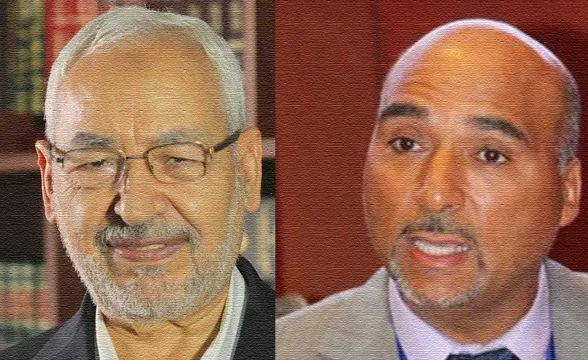July 4, 2025 – The Fourth Criminal Chamber of the Court of Appeal in Tunis decided today to postpone the trial of the case known in the media as the “Ramadan Evening Meeting” to a session on September 30, 2025. The case involves several Ennahda leaders:
- Rached Ghannouchi (the movement’s leader who has been in detention for nearly two and a half years)
- Ahmed Mechregui (his chief of staff who has been in detention for nearly two and a half years)
- Youssef Nouri (party member, who has been in detention for nearly two and a half years)
- Belkacem Hassan (former MP)
- Mohamed Goumani (former MP)
- Mohamed Cheniba (party member and student activist)
- Mouaffak Bellah Kaabi
- Abdallah Skhiri
Case Background:
The case relates to a Ramadan evening meeting organized in 2023 by the National Salvation Front in solidarity with political prisoners. It was moderated by Belkacem Hassan, while Mohamed Goumani delivered a political presentation.
The primary charge against Rached Ghannouchi is a statement he made during a live broadcast: “Eradication, whether directed against Islamists or leftists, is a recipe for internal strife.” This sentence constitutes the basis of the indictment, without a precise legal explanation for the inclusion of the other defendants.
It is worth noting that Ghannouchi was previously sentenced to 22 years in prison in the “Instalingo” media company case and to a year and a half in another case known in the media as the “Taghout Case,” based on the interpretation of eulogies he made at the funeral of a member of the Ennahda Movement.
Despite this, Ghannouchi has boycotted all trial sessions, considering them “judicial farces,” emphasizing his refusal to recognize the legitimacy of the “politicized” judicial proceedings.
Position of the Tunisian Freedom Observatory:
The Freedom for Tunisia Observatory believes that the targeting of Rached Ghannouchi and other political and civil leaders is part of a political purge aimed at eliminating all opponents of the July 25 regime.
The Freedom for Tunisia Observatory considers that relying on statements taken out of context to bring serious charges represents a grave violation of freedom of expression and legitimate political activity. The prosecution of political leaders for their positions expressed in public meetings is a clear violation of the constitution and ratified international conventions. The Observatory also condemns the continued detention of Rached Ghannouchi for more than two years without a valid legal basis, which it considers a form of arbitrary detention.
The Observatory demands:
- The immediate release of Rached Ghannouchi and all those detained in connection with the “Ramadan meeting case.”
- The dropping of politicized charges and the closing of all judicial cases based on public political positions.
- The cessation of the political exploitation of the judiciary and the restoration of the principles of judicial independence.
- Respect for the sanctity of political expression and the right of the opposition to criticize the executive without being subject to criminalization.





